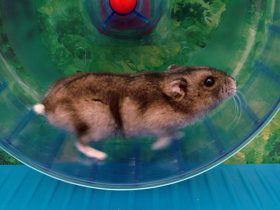Hamster wheels, also called running wheels, are essential for your hamsters, gerbils or mice. These small rodents are born to run. Hamsters can run up to five miles in a night while looking for food. Running in a hamster wheel strengthens the heart and muscles. Hamsters that have hamster wheels in their cage are less likely to chew on things they shouldn’t. And scientific studies show that mice given free access to hamster wheels are less likely to develop Alzheimer’s disease.
So a hamster wheel is an important part of your pet rodent’s environment. If you have multiple hamsters, gerbils or mice, you will need to buy multiple hamster wheels. That way, they don’t have to take turns.
Hamster Wheel Specifics

See a selection of Hamster Wheels at Chewy.com
It’s very important that your hamster wheel diameter is large enough so that your pet rodent’s back is not arched while running in it. Running in the wheel should not be much different than running on flat ground. Obviously the size of the hamster wheel will vary depending on the size of your pet.
The running surface should be solid. It can have some minimal texture in order to avoid slipping, but there should be no openings, cracks or holes that can catch tiny feet. Do not buy a hamster wheel with metal rungs and gaps in between. Your pet rodent’s legs can be easily injured and broken if they slip into the gaps. These types of hamster wheels are especially dangerous for gerbils and mice because their tails can get caught in the gaps as well.
Look for quiet hamster wheels, especially if you sleep within earshot of your hamsters, gerbils or mice. Rodents are generally nocturnal creatures and your pets can be quite active when the lights go off. Some will run several miles at night. Many hamster wheels on the market advertise that they are silent. If your Hamster wheel squeaks, you can try adding a few drops of vegetable oil to the noisy parts.
Pet hamsters, gerbils and mice need hamster wheels almost as much as they need food and water. You are already have one in your new pet’s cage when you bring it home.
Wild Mice Like Hamster Wheels, Too!
Some animal rights activists claim that wheel running is neurotic behavior caused in by living in a cage. But researchers set up hamster wheels and video cameras with infrared motion detectors various outdoor locations with food to lure nocturnal visitors. Over 700 cases of mice using the hamster wheels were recorded. They ran from 1 to 18 minutes sometimes jumping off and back on again. And they came back to run in the wheels even when no food was present. It seems that the mice were running for fun!

